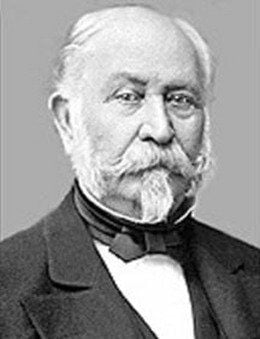This is a column of selected reader responses to columns that have appeared in this space from two weeks to two years ago.
Peter Hellman, a resident of Sacramento County, California, replies to the Jan. 7 column about John Sutter’s enslavement of American Indians in California before he came east to reside and eventually die in Lititz in 1880.
“I am writing not to exonerate John Sutter’s behavior toward the Indians,” he writes. “Rather, I would like to bring to light his positive contributions.”
Among those contributions, Hellman notes that Sutter’s fort welcomed overland travelers from the East. Sutter also dispatched soldiers to rescue the surviving members of the Donner Party, which was trapped in heavy snow in the Sierra Nevada of California.
Hellman says a case can be made that the discovery of gold on Sutter’s property “kept California in the Union, as eventually there were debates whether California would be a slave state.”
Sutter was “not perfect by any means,” Hellman concludes, “but I suggest that you let him rest in peace.”
Conestoga-Susquehannocks
Michael Mantooth, a Denver, Colorado, resident and spokesperson for the Conestoga-Susquehannock tribe, brings us up to date on tribal initiatives. This column revealed the existence of some 50 documented members of the tribe last March 12.
Wolff says the Conestoga-Susquehannocks are working with researchers at Johns Hopkins University in an effort to be recognized by the federal government in the state of Maryland. (No American Indian groups in the state of Pennsylvania are federally recognized.)
The group also is building an app that teaches users about Mingo, a subset of the Iroquois language. Bill Sock wrote down the essentials of Mingo at Conestoga Indian Town in Manor Township. Sock was one of the 20 Conestogas massacred by the Paxton Rangers in December 1763.
More information about the tribe can be found at the website: conestogasusquehannocktribe.com.
Expanded enslavement
On Feb. 6, 2022, the Scribbler quoted from a Washington Post article that found that more than 1,700 of the 5,558 U.S. senators and representatives who were born before 1840 enslaved African Americans.
At least two of those men at one time represented Lancaster County in Congress: Amos Slaymaker (1755-1837) and John Whitehill (1729-1815). Both men lived in Salisbury Township.
Following up on the Post’s reporting, the Scribbler quoted published sources as noting that Slaymaker had enslaved three people and Whitehill two.
George Nagle, a Harrisburg resident, operates a website chronicling enslavement in central Pennsylvania. He calls it the Afrolumens Project. Nagle recently found the Scribbler’s 2022 column. He checked Slaymaker’s and Whitehill’s entries under requirements of Pennsylvania’s 1780 gradual abolition law and other records.
Those records show Slaymaker enslaved two women and their three children. Whitehill enslaved a man, a woman and her five children.
More detailed information about Slaymaker, Whitehill and other enslavers and the people they enslaved in central Pennsylvania is available at Nagle’s website: afrolumens.com.
Y’all,
Ted Nichols, of Leola, says the Scribbler’s commentary about the expanding use of “yeah-yeah” in speech reminded him that when he was in South Carolina he sometimes heard “y’all, y’all.” He was told that the double use represented a plural form of “y’all.”
Janet Hope, of Mount Joy, says she is weary of some people using “goes” or “went” when they mean “says” or “said.” Example: “Then he goes, ‘I told you so.’ ”
Annette Moyer, of Narvon, lists some phrases that “grate on my ears.” One of them is “a half baked chicken.” More accurate, she says, would be “a baked half chicken.”
Jack Brubaker, retired from LNP | LancasterOnline staff, writes “The Scribbler’’ column every Sunday. He welcomes comments and contributions at scribblerlnp@gmail.com.


![Why institutions named for famous Lititz resident Sutter are choosing new titles [The Scribbler]](https://bloximages.newyork1.vip.townnews.com/lancasteronline.com/content/tncms/assets/v3/editorial/1/05/1059b1b0-aab7-11ee-a291-93ea2585e940/65962f8cb0fcc.image.jpg?crop=260%2C268%2C0%2C2&resize=194%2C200&order=crop%2Cresize)
![Did Buchanan actually vacation on the Conestoga and Salt rivers? [The Scribbler]](https://bloximages.newyork1.vip.townnews.com/lancasteronline.com/content/tncms/assets/v3/editorial/9/96/99639382-4e82-11ed-b53e-63f601000426/634dfe9a6eabe.image.jpg?resize=150%2C150)


